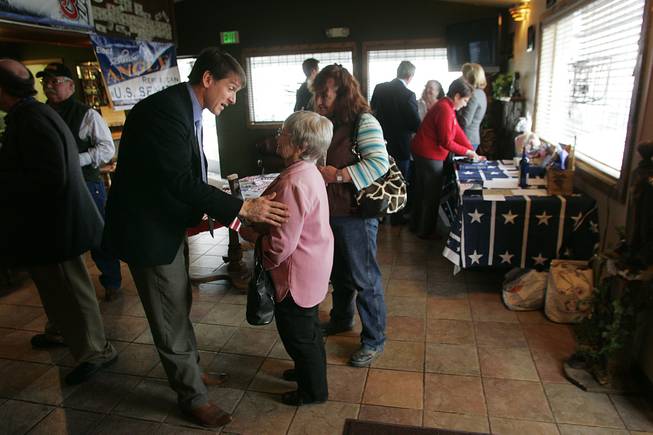
Senate candidate John Chachas talks to a voter after a luncheon at the Hide-A-Way Steak House in Battle Mountain during a swing through Northern Nevada on the Lincoln Day dinner circuit Saturday, February 20, 2010.
Sunday, April 25, 2010 | 2 a.m.
Sun archives
- Republican Senate hopeful John Chachas in D.C. (3-17-2010)
- Harry Reid calls on opponents to denounce ‘sleaze’ ad (3-15-2010)
- Harry Reid takes on Sue Lowden early, hoping labor is listening (3-14-2010)
- Harry Reid makes campaign official, says ‘much work to be done’ (3-8-2010)
- Sue Lowden files for U.S. Senate seat to battle Harry Reid (3-1-2010)
Sun Coverage
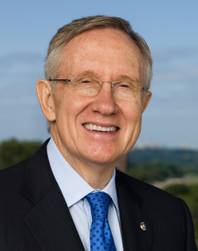
Harry Reid
John Chachas’ candidacy to unseat Senate Majority Leader Harry Reid is so unlikely that some might think it a Trojan Horse fashioned by the calculating minds of Reid’s political operation.
Consider just a few details of Chachas’ biography and politics:
Raised in Ely, White Pine County, Chachas left to attend Columbia University and then Harvard and has made millions as a Wall Street investment banker for a firm with a ludicrously French sounding name. Need it be said? Wall Street, which Americans blame — with some justification — for the Great Recession, is not the best place from which to run for office this year.
Chachas lives on Central Park West in Manhattan — a typical address for a couple whose wedding was featured in The New York Times — but is running his campaign from a summer home in Ely. He and his wife are unsure where they’ll live if Chachas were to win, the education of his three children being, as is the case with Wall Street families, of vital importance. “We’re not going to be home schooling them in Ely,” Chachas told the Las Vegas Review-Journal. The implication was clear and much noted in the local press — sending his children to White Pine County schools? Gosh no.
His policy preferences almost seem crafted to make him unpopular. He would go right at Middle America’s bipartisan sacred cows — cutting Social Security and Medicare and reducing the mortgage interest tax deduction for homeowners.
In a normal year and a normal place, Chachas might be laughed off.
And yet, this is an odd year, and this is Nevada.
Reid persuaded the best potential Republican challengers to take a pass on running this year, leaving a gaggle of second-tier candidates who will split the primary vote June 8, giving at least four candidates a chance at victory.
Chachas reported $1.3 million on hand at the end of the first quarter, enough to make himself locally famous and hurt his opponents. As few as 33,000 votes could win the Republican primary.
If he wins the primary, “capital will flow into this race,” Chachas says, employing, as he often does, Wall Street jargon. “And there will be ‘The A-Team’ of Republican politics to allocate that capital.”
Then there is Reid, who is a dream candidate for the opposition — the only thing as equally reviled these days as Wall Street is Washington, where Reid has been living at the Ritz-Carlton, helping pass unpopular legislation such as bank and auto bailouts and health care reform with his characteristic lack of charisma.
And so, John Chachas, 45, must be taken seriously.
He is rigorously intellectual, enjoys the back-and-forth of real dialogue and debate, and seems happy to say what everyone believes, but is unwilling to utter.
It’s time to stop looking to government for solutions
Chachas occupies an ideological space that has been all but vacated in recent years: The deficit hawk.
Both parties are complicit in a dangerous fiscal game, experts agree. Republicans love massive tax cuts and gave us unpaid-for wars and an unfinanced prescription drug entitlement. Democrats passed the nearly $800 billion stimulus and are unwilling to raise taxes on those making less than $250,000. Neither party will cut defense or Social Security.
Combined with an aging population that will soon be collecting more Social Security and Medicare benefits, these policies could lead to fiscal catastrophe in the medium term, with the cost of borrowing rising steeply for everyone, including average people.
“I got into this race because I don’t want my kids to have a lower standard of living than I did,” he said at a “meet and greet” at a Gordon Biersch restaurant in the Summerlin area.
Chachas is fit and wears suits that appear to be expensive.
Given his considerable wealth and investment expertise and the laws of compound interest, it’s unlikely his three children won’t have a better standard of living, but the point still holds.
Chachas pointed out to the dozen or so people who attended the event that nondefense discretionary federal spending, which excludes Medicare and Social Security and interest on the debt, amounts to less than $500 billion, about one-third of the federal budget deficit. In other words, cutting spending on food stamps, farm subsidies, high-speed rail or earmarks won’t even make a dent.
“We’re going to have to sacrifice. Parts of society will have to stop looking to the state and federal government for solutions.”
But shouldn’t Chachas and his neighbors on Central Park West also sacrifice? After all, the wealthiest 10 percent of Americans have soaked up much of the income and wealth gains of the past 30 years, while taxes on their income and investments have been cut. And since the deregulation of the financial services industry beginning in the late 1970s, workers with those firms have seen their incomes skyrocket to an average of nearly $100,000, or twice the rest of the private sector, according to James Kwak, co-author of a recent book on the industry, “13 Bankers.”
Chachas conceded the point and said more taxes on the wealthy are acceptable, specifically pointing to an excise tax on luxury goods.
But he also pointed out, correctly, that these tax increases would not solve the deficit.
And this is where he began stepping into political mine shafts.
“What that means is the middle class has to pay something,” he said. He suggested eliminating the mortgage interest tax deduction, which costs $573 billion a year. Real money.
This is the type of proposal that policy wonks like, but politicians don’t touch. Economists across the spectrum criticize the mortgage deduction for its distorting effects: It favors buyers over renters, suburban development over urban and encourages Americans to buy homes when they might better invest their money elsewhere, which helped fuel the last decade’s housing bubble.
For politicians though, eliminating the deduction amounts to a tax increase on homeowners, who tend to vote en masse.
Stacks of free Chachas T-shirts at the Gordon Biersch event went untouched.
In a previous interview, Chachas said that although he didn’t like the big 2008 bank bailout, or Troubled Asset Relief Program, he doubts he would have been able to say no to then-Treasury Secretary Henry Paulson as the country’s financial system teetered on the brink of collapse.
When it came to embracing unpopular positions, Chachas wasn’t finished there, though. He said the age at which Americans are eligible for Social Security should rise to 70 and that the program should be “means-tested” — Washington-speak for granting the benefit only to those Americans below a certain income level.
As he made his points in an interview, Chachas ate finger food from the spread his campaign put out at Gordon Biersch, and suddenly politics seemed, literally, distasteful.
“This is really terrible food. Disgusting.”
American consumers deserve part of blame for current situation
Chachas has other ideas, some of which he disseminates through tightly argued polemics posted on his website or sent via e-mail — another unique facet of his campaign.
The ideas range from Republican boilerplate to distant departures from Republican or Democratic talking points — ideas that could truly be called innovative.
In the first category, of the familiar, he would cut capital gains taxes to zero for “three or four years” and reduce taxes on corporations so they’ll invest in new equipment and create jobs.
He favors auctioning 10 million federal acres in Nevada with favorable tax treatment for buyers, another favorite of some conservatives.
A similar plan to privatize federal land was proposed by then-Rep. Jim Gibbons and shot down by the Republican Congress in 2005. A broad coalition of sportsmen, conservationists and landowners feared its effect on water, wildlife and land values.
Chachas proposes aggressive action to deal with the foreclosure crisis: “Unusual circumstances require extraordinary action, and Nevada cannot simply sit and wait for an organic resolution of a housing devaluation as wide and deep as the Silver State is experiencing,” he wrote in a piece posted on his website.
He would use money from the federal-land sale — assuming it were to occur — to charter a Nevada Housing Resolution Bank. This bank, a private institution funded with public money, would work with lenders to reduce homeowners’ principal mortgages by up to 30 percent.
Chachas said underwater homeowners are a key factor preventing recovery, combined with another phenomenon: extreme consumer debt.
“Something happened in American culture about 25 years ago where we stopped being a country that saved money and focused on the long-term future, and spent money today instead,” he said.
Here he is again, saying what most politicians are unwilling to: American consumers deserve a share of the blame for what has befallen them.
He proposed allowing Americans to pay off a portion of their consumer debt with income that would be shielded from taxes to help them get out from under their creditors.
And, he advocated something more radical, modeled after Chile’s system: Forcing people to save money, with a portion of their paychecks going into an investment vehicle, which would create savings and reduce dependency on Social Security.
Chachas’ true expertise, though, is Wall Street, and what needs to change about it.
He decried the policies of the Federal Reserve for the past two decades, which allowed people to borrow money cheaply and then invest it, which created asset bubbles, first in technology companies, and then in real estate.
He acknowledged the failures of widespread banking deregulation and the falling down of regulators walking the beat.
Mortgage loan originators who packaged and resold mortgages as the real estate bubble inflated had no stake in the success or failure of the mortgages, so they gave them out willy-nilly to homebuyers who couldn’t afford them, Chachas said.
He even appears ambivalent about his own business. Chachas has advised large media companies, but said newspapers — and society — might have been better off if they had been left in private, family hands and treated as civic trusts rather than Wall Street cash cows to be milked dry.
In Washington, Chachas, it seems, would be a force for reform — experienced and knowledgeable, empathetic of his old Wall Street colleagues but aware of their shortcomings. He could be Nixon going to China.
For many, government is vampire squid and Reid one of its fangs
He may have left Wall Street, but Wall Street doesn’t seem to have left Chachas.
This was evident recently, in the wake of a Securities and Exchange complaint against Goldman Sachs for allegedly structuring a financial instrument to fail so that a client could win big by betting against it.
Chachas sent out a news release that could have been written by the Wall Street titan’s public relations team, accusing the Obama administration of a politically motivated investigation, a “public relations stunt” used to manipulate the current debate in Congress over financial reform. He called it “vintage Chicago politics,” and “the most cynical form of political leverage.”
And, finally, “Demonizing an American finance icon makes for good politics, but that’s all it is.”
Chachas seems to have missed the fact that Goldman’s status as an American icon is in jeopardy. It has become, in the public imagination, what Matt Taibbi called it in Rolling Stone last year, “a great vampire squid wrapped around the face of humanity, relentlessly jamming its blood funnel into anything that smells like money.”
Of course, for many Americans such as Chachas, it’s the federal government that is the vampire squid, and Harry Reid one of the fangs.
So if Chachas wins the Republican primary, Nevadans can look forward to a fascinating debate.
Reid vs. Chachas would pit Washington vs. Wall Street.
Unfortunately, Nevadans would be largely beside the point — bystanders in a centuries-old battle for control of the country’s real power and money back East.
Sun librarian Rebecca Clifford-Cruz contributed to this story.
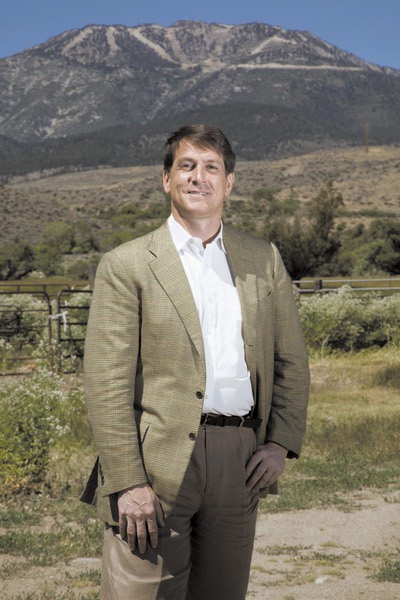

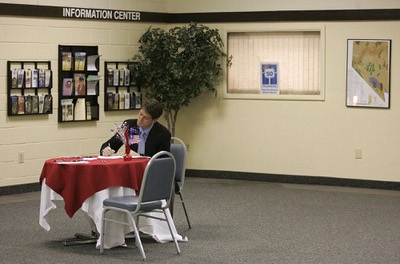
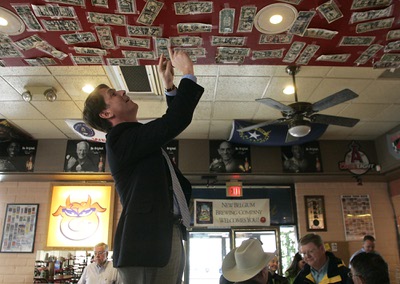

Join the Discussion:
Check this out for a full explanation of our conversion to the LiveFyre commenting system and instructions on how to sign up for an account.
Full comments policy